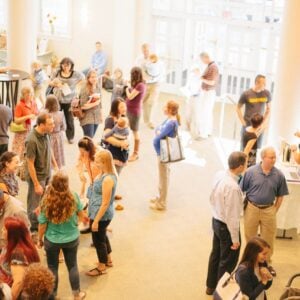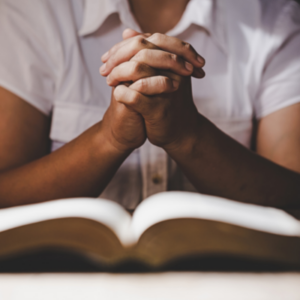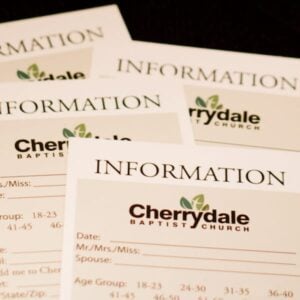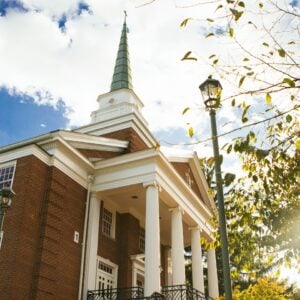Constitution approved March 19, 2017
View our Membership Covenant View our Church Bylaws
Article 1 – Name
The name of this church shall be Cherrydale Baptist Church of Arlington, Virginia. The word “church,” whenever used in this Constitution without further elaboration, refers to Cherrydale Baptist Church.
Article 2 – Purpose
The purpose of this church is to glorify God by loving Him and loving people. Loving God is reflected in consistent obedience to all that Jesus commanded, Spirit-filled worship, and administering the ordinances of baptism and the Lord’s Supper. Loving people is reflected in spreading the gospel of Christ, making disciples, and equipping them to maturity in Christ so that gospel growth continues to increase until Christ’s return. Matthew 22:37–40; 28:18–20; Acts 2:42; Ephesians 4:11–16; 5:18–21; Philippians 1:12–20. Thus, the church is organized exclusively for religious purposes.
Article 3 – Statement of Faith
We, the church, acknowledge that the following articles of faith in no way exhaust the content of our faith, which is the entire Word of God. We do believe, however, that these articles are true representatives of sound doctrine in the Scriptures.
A. OF THE SCRIPTURES
We believe that the Holy Bible (the 66 books of the Old and New Testaments) as originally written was verbally inspired and the product of Spirit-controlled men, and therefore has truth without any admixture of error for its matter. We believe the Bible to be the supreme standard by which all human conduct, creeds and opinions shall be tried. 2 Timothy 3:16, 17; 2 Peter 1:19–21
B. OF THE ONE TRUE GOD
We believe there is one, and only one, living and true God, an infinite, intelligent Spirit, the Maker and Supreme Ruler of heaven and earth; inexpressively glorious in holiness, and worthy of all possible honor, confidence and love; that in the unity of the Godhead there are three persons, the Father, the Son, and the Holy Spirit, equal in every divine perfection, and executing distinct but harmonious offices in the great work of redemption. Exodus 20:2, 3; 1 Corinthians 8:6; 1 John 5:7; Revelation 4:11
C. OF THE HOLY SPIRIT
We believe that the Holy Spirit is a divine person; equal with God the Father and God the Son and of the same nature; that He was active in the creation; that in His relation to the unbelieving world He restrains the evil one until God’s purpose is fulfilled; that He convicts of sin, of righteousness, and of judgment; that He bears witness to the truth of the gospel in preaching and testimony; that He is the agent in the New Birth; that He seals, endues, guides, teaches, witnesses, sanctifies and helps the believer. Genesis 1:1–3; Matthew 28:19; Mark 1:8; Luke 1:35; 24:49; John 1:33; 3:5, 6; 14:16, 17, 26; 16:8–11; Acts 5:30–32; 11:16, Romans 8:14, 16, 26, 27; Ephesians 1:13, 14; Hebrews 9:14
D. OF ANGELS, SATAN, AND DEMONS
We believe God created sinless spirit beings called angels to worship and serve Him. Isaiah 6:3; Colossians 1:16; Hebrews 1:14
We believe that some of the angels rebelled against God, and that one, Satan, now rules these fallen angels called demons. We believe in the personality of Satan, that he is the unholy god of this age, and the author of all the powers of darkness, and is destined to the judgment of an eternal justice in the lake of fire. Matthew 4:1–3; 25:41; Ephesians 6:11–12; 2 Corinthians 4:4; 1 Timothy 3:6; Revelation 20:10
E. OF THE CREATION
We accept the Genesis account of creation and believe that man came by direct creation of God and not by evolution. Genesis 1 and 2; John 1:3; Colossians 1:16, 17
F. OF THE FALL OF MAN
We believe that man was created in innocence under the law of his Maker, but by voluntary transgression fell from his sinless and happy state, in consequence of which all mankind are now sinners, not only by constraint but by choice; and therefore under just condemnation without defense or excuse. Genesis 3:1–6; Romans 1:18, 32; Romans 3:10–19; 5:12, 19
G. OF THE VIRGIN BIRTH
We believe that Jesus Christ was begotten of the Holy Spirit in a miraculous manner, born of Mary, a virgin, as no other man was ever born or can ever be born of woman, and that He is both the Son of God and God, the Son. Genesis 3:15; Isaiah 7:14; Matthew 1:18–25; Luke 1:35; John 1:14
H. OF THE ATONEMENT FOR SIN
We believe that the salvation of sinners is wholly of grace; through the mediatorial offices of the Son of God who, by the appointment of the Father, freely took upon Him our nature, yet without sin, honored the divine law by His personal obedience, and by His death made a full and vicarious atonement for our sins; that His atonement consisted not in setting us an example by His death as a martyr, but was a voluntary substitution of Himself in the sinner’s place, the just dying for the unjust; Christ, the Lord, bearing our sins in His own body on the tree; that having risen from the dead, He is now enthroned in Heaven, and uniting in His wonderful person the tenderest sympathies with divine perfection He is in every way qualified to be a suitable, compassionate and all-sufficient Savior. Isaiah 53:4–7; Matthew 18:11; John 3:16; Acts 15:11; Romans 3:24, 25; 1 Corinthians 15:3; 2 Corinthians 5:21; Ephesians 2:8; Philippians 2:7; Hebrews 2:14; 1 John 4:10
I. OF GRACE IN THE NEW CREATION
We believe that in order to be saved, sinners must be born again; that new birth is a new creation in Christ Jesus; that it is instantaneous and not a process that in the new birth the one dead in trespasses and sins is made a partaker of the divine nature and receives eternal life, the free gift of God; that the new creation is brought about in a manner above our comprehension, solely by the power of the Holy Spirit in connection with divine truth, so as to secure our voluntary obedience to the gospel; that its proper evidence appears in the holy fruits of repentance and faith and newness of life. John 3:3, 6–8; Acts 16:30–33; Romans 6:23; 2 Corinthians 5:17, 19; Ephesians 2:1; Colossians 2:13; 2 Peter 1:4; 1 John 5:1.
J. OF JUSTIFICATION
We believe that the great gospel blessing which Christ secures to such as believe in Him is justification; that justification includes the pardon of sin, and the gift of eternal life on principles of righteousness; that it is bestowed not in consideration of any works of righteousness which we have done; but solely through faith in the Redeemer’s blood, His righteousness is imputed unto us. Isaiah 53:11; Zechariah 13:1; Acts 13:39; Romans 5:1, 9; 8:1
K. OF FAITH AND SALVATION
We believe that faith in the Lord Jesus Christ is the only condition of salvation. Acts 16:31
L. OF THE CHURCH
1. The Local Church
We believe that a local church is a congregation of believers, associated by covenant of faith and fellowship of the gospel; observing the ordinances of Christ, namely, Baptism and the Lord’s Supper; governed by His laws; and exercising the gifts, rights and privileges invested in them by His word; that its offices are elder and deacon, whose qualifications, and duties are clearly defined in the Scriptures; we believe the true mission of the church is to witness faithfully to all people about Christ, and to make disciples of all nations. We hold that the local church has the absolute right of self-government, free from the interference of any hierarchy of individuals or organizations; and that the one and only superintendent is Christ, through the Spirit; that it is scriptural for true churches to cooperate with each other in contending for the faith and for the furtherance of the gospel; that each local church is the sole judge of the measure and method of its cooperation, on all matters of memberships, of polity, of government, of discipline, of benevolence, the will of the local church is final. Matthew 28:18–20; Acts 1:8; 2:41, 42; 15:13–18; 20:17–28; 1 Corinthians 11:2; Ephesians 1:22, 23; 4:11–16; 5:23, 24; Colossians 1:18; 1 Timothy 3:1–13; Titus 1:5–9
2. The Invisible Church
We believe that all the saved of this dispensation are baptized by the Holy Spirit into the body of Christ, which is the invisible church, the instant they believe. 1 Corinthians 12:12,13
M. OF BAPTISM AND THE LORD’S SUPPER
We believe that Jesus Christ has instituted and established two ordinances for His Church: the initial ordinance of baptism and the ongoing ordinance of the Lord’s Supper. We believe that baptism is the visible identification of a believer with Christ through water. Baptism is an act of obedience that proclaims the believer’s faith in and union with Christ in His death, burial, and resurrection, which is best represented by immersion. Baptism also symbolizes the believer’s baptism of the Holy Spirit and cleansing from all sin and unrighteousness by the power of Christ’s blood. As an ordinance, baptism is prerequisite to the privileges of local church membership. Matthew 3:16; John 3:23; Acts 8:36–39; Romans 6:3–5; Colossians 2:12
Whereas baptism symbolizes the believer’s initial union with Christ at conversion, the Lord’s Supper symbolizes the believer’s ongoing union with Christ as His committed followers. We believe that the Lord’s Supper is the commemoration of His death until He comes, and should be preceded always by solemn self-examination. 1 Corinthians 11:23–28
N. OF THE SECURITY OF THE SAINTS
We believe that all who are truly born again are kept by God the Father for Jesus Christ. John 10:28, 29; Romans 8:35–39; Philippians 1:6; Jude 24, 25
O. OF THE RIGHTEOUS AND THE WICKED
We believe that there is a radical and essential difference between the righteous and the wicked; that such only as through faith are justified in the name of the Lord Jesus Christ, and sanctified by the Spirit of our God, are truly righteous in His esteem; while all such as continue in impenitence and unbelief are in His sight wicked, and under the curse; and this distinction holds among men both in and after death, in the everlasting felicity of the saved and the everlasting conscious suffering of the lost. Genesis 18:23; Proverbs 14:32; Malachi 3:18; Matthew 25:34–41; Luke 6:25; John 8:21; Romans 6:17, 18, 23; Romans 7:6; 1 John 5:19
P. OF CIVIL GOVERNMENT
We believe that civil government is of divine appointment, for the interests and good order of human society; that magistrates are to be prayed for, conscientiously honored and obeyed, except in things opposed to the will of our Lord Jesus Christ, who is the only Lord of the conscience, and the coming Prince of the Kings of the earth. Exodus 18:21, 22; 2 Samuel 23:3; Daniel 3:17, 18; Matthew 22:21; Acts 4:19, 20; Acts 23:5; Romans 13:1–7
Q. OF THE RESURRECTION, PERSONAL, VISIBLE, PREMILLENNIAL RETURN OF CHRIST, AND RELATED EVENTS
We believe in:
1. The bodily resurrection of Jesus Christ. Matthew 28:6, 7; Mark 16:6; Luke 24:2–6, 39; John 20:27; 1 Corinthians 15:4
2. The ascension of Jesus Christ. Mark 16:19; Luke 24:51; Acts 1:9–11; Hebrews 12:2; Revelation 3:31
3. The High Priesthood of Jesus Christ. 1 Timothy 2:5; Hebrews 2:17; 5:9, 10; 8:6; 1 John 2:1
4. The coming of the Lord Jesus Christ for the invisible church including the resurrection of the dead in Christ and the change of the living in Christ. John 14:3; 1 Corinthians 15:42–44, 51–53; Philippians 3:20, 21; 1 Thessalonians 4:13–18; 5:1–10; 2 Thessalonians 2:6–8; Revelation 3:10
5. The Great Tribulation. Psalm 2:5; Jeremiah 30:1–9; Daniel 12:1; Matthew 24:21, 22, 29, 30
6. The personal, visible return of the Lord Jesus Christ, with the Saints, to reign on the throne of David and establish the millennial kingdom. Psalm 72:8; Isaiah 9:6, 7; Isaiah 11:1–10; 32:1; Zechariah 14:4, 5; Matthew 16:27; 24:29, 30; Luke 1:32; Acts 1:11; 2:29, 30; 1 Corinthians 15:25; 1 Thessalonians 3:13; 4:14; 2 Thessalonians 1:7–10; 1 Timothy 6:14–16; Revelation 19:11–16; 20:4–15
7. The new heaven and the new earth. Isaiah 65:17; 2 Peter 3:12, 13; Revelation 21:1
Article 4 – Church Governance
Under the authority of Jesus Christ (Matthew 16:18; Colossians 1:18) and the Word of God (Acts 20:32; 2 Timothy 3:16–17), the church’s governing authority rests exclusively in the local body (Matthew 18:15–17; Acts 11:22; 1 Peter 2:9) and is exercised by the assembly of members in member meetings. The church membership delegates authority to a Council of Elders commensurate with its designated responsibilities, as specified in the Bylaws (Philippians 1:1; Hebrews 13:17; 1 Peter 5:1–4).
Article 5 – Church Membership
Section 1: Qualifications and Reception
A. The membership of this church shall consist of adults who have been baptized as believers, have demonstrated their faith in the Lord Jesus Christ to the satisfaction of the Council of Elders , and subscribe to the Cherrydale Statement of Faith and Covenant.
B. Members will be received at a member meeting in accordance with the Bylaws.
Section 2: Participation
Each member shall be privileged and expected to participate in and contribute to the life and ministry of the church, in accordance with God’s leading and provision of time, material resources, and spiritual gifts.
A. Cherrydale Covenant
We join together to love God, purposing to make time daily for Bible study, meditation, and prayer, and to seek the filling and refreshing of the Holy Spirit that we may know His will and live a victorious and holy Christian life through His power. We earnestly endeavor to maintain a godly home life and to bring up those under our care in the nurture and admonition of the Lord.
We unite together in attending, with our family, the services of the church in order to be better equipped to serve Christ.
We unite in loving one another, ever striving to keep the unity of the Spirit in the bond of peace and good works.
As far as it depends on us, we will live peaceably with everyone, and denying ungodliness and every worldly lust, we will seek by example and word to win the unsaved to the Lord Jesus Christ.
We join in supporting the ministries of our church and its worldwide mission thrust in every way possible, especially by fervent prayer and by faithful giving of our means as God has prospered us.
If leaving this place, we commit ourselves to unite as soon as possible with another church where we can carry out the spirit of this covenant and the principles of God’s Word.
B. Membership Responsibilities (Implicitly found in multiple articles, combined here)
The church membership is responsible for affirming elders, deacons, and missionaries of the church, and making other major decisions as specified in the Bylaws.
Article 6 – Elders and Deacons
The offices of the church shall be elder and deacon (Philippians 1:1; 1 Timothy 3:1–13).
Section 1: Elders
Elders shall be responsible for leading, teaching the Word and shepherding the flock of God in this church (Acts 20:17, 28; 1 Peter 5:1–4). Qualifications for elders are described in 1 Timothy 3:1–7 and Titus 1:5–9. Elders shall organize as a Council to exercise the authority delegated to them by the church membership. Pastors are those specific elders who, in response to God’s call, have devoted their vocation to pastoral ministry.
Section 2: Deacons
Deacons shall assist the Council of Elders by serving to support ministries of the church, care for the church, and perform certain administrative functions (Acts 6:1–7; Romans 16:1–2; Philippians 1:1). Specific deacon positions shall be established by the Council. Qualifications for deacons are described in 1Timothy 3:8–13.
Article 7 – Property
Cherrydale Baptist Church maintains property and facilities for the use of church ministries, kingdom partnership ministries, and non-profit service organizations in the community whose activities are not incompatible with the church’s purpose and Statement of Faith. The Council of Elders shall steward the property and facilities to fulfill this purpose.
The Council of Elders shall be the legal trustees of the church in whom is vested the legal title in the real and personal property of the church in accordance with Title 57 of the Code of Virginia. The trustees may only take such actions with respect to the church property in accordance with this Constitution and the Bylaws.
Article 8 – Amendments
This church Constitution, including the Statement of Faith, may be amended by a two-thirds vote of the members present and voting at a member meeting, provided the amendment shall have been provided in writing at the previous member meeting, and shall have been announced from the pulpit at church services two successive Sundays prior to such vote.





